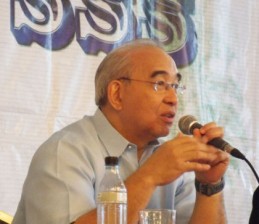SSS head calls grant of P1M bonus to each executive ‘moral’
MANILA, Philippines — Emilio de Quiros Jr., president and chief executive officer of Social Security System, said he believed the granting of hefty bonuses to members of the state-run firm’s board was moral.
“On the question whether it [granting of the bonuses] was moral, I say yes,” De Quiros said in a press conference Tuesday.
“If you need to hire people and if you are competing against companies from the private sector, you need to compensate people well,” he added.
De Quiros made the statement amid criticisms that although the granting of huge bonuses to the SSS board members was legal, it was immoral.
The eight members of the SSS board got a performance bonus of about P1 million each for the state-run firm’s performance for 2012.
Article continues after this advertisementThe bonuses were given in accordance with the performance-incentives sytem set by the Governance Commission for Government-owned and -controlled corporations (GCG), which operates under the Office of the President.
Article continues after this advertisementDe Quiros said the SSS and other government-owned and -controlled corporations should be competitive against companies from the private sector in order to attract qualified people to work for them.
He challenged critics to compare the bonuses given to the SSS board with those enjoyed by officials working in privately owned banks. He insinuated that the bonuses got by the SSS board members were either comparable or lower than those in the private sector.
“You have to be able to get the right individuals to manage the institution,” De Quiros said.
The SSS investment reserve fund, which determines the ability to pay for pension and other benefits, now stands at close to P390 billion, according to De Quiros. This is higher compared with P290 billion at the start of the Aquino administration.
“The fund has increased by nearly P100 billion since we started,” De Quiros said.
He acknowledged, however, that the fund of the SSS would have a long way to go before hitting the ideal level set by international standards.
According to international standards, the life of a pension fund should be in “perpetuity,” meaning it should be enough to cover liabilities for 70 years or more.
In the case of the SSS, its fund is good to cover liabilities for 26 years or until 2039, according to De Quiros. The relatively short life of the SSS fund is the reason it is increasing the members’ contribution rate by January 2014.
Reports about the bonuses, which came out about the same time as the announcement of the hike in members’ contributions starting 2014, elicited criticisms, including those from SSS employees and SSS members.
Some employees thought the bonuses granted to the members of the board were unfair, while some SSS members said the bonuses were not justified because the process of getting claims from the SSS continued to be tedious.
In an earlier interview, De Quiros said SSS employees also got bonuses. In fact, he said, the SSS disbursed P276 million in bonuses to employees covering the state-run firm’s performance last year.
The bonuses to employees were released in December 2012, while those for the board members were distributed only last month, De Quiros said.
He surmised that the complaints from the employees came from those who received no bonus because of poor performance.
Under the performance-incentives system observed by the SSS, all the estimated 5,000 employees are graded and ranked based on performance.
Those in the Top 10 percent of the ranking get the maximum bonus, set at 2.5 percent of monthly salary. Those in the middle of the rankings get either 1.25 or 1.5 percent of their monthly salaries. Those in the bottom 10 percent get nothing.
As far as the board members are concerned, the performance-incentive system states that the bonus a board member gets is equivalent to 100 percent of the total per diems he or she got for the year.
The per diem is set at P40,000 per board meeting and P20,000 per committee meeting. A maximum of two board meetings and two committee meetings are held in one month.
This means the bonus of a board member is mainly dependent on the number of attendance to board and committee meetings.
